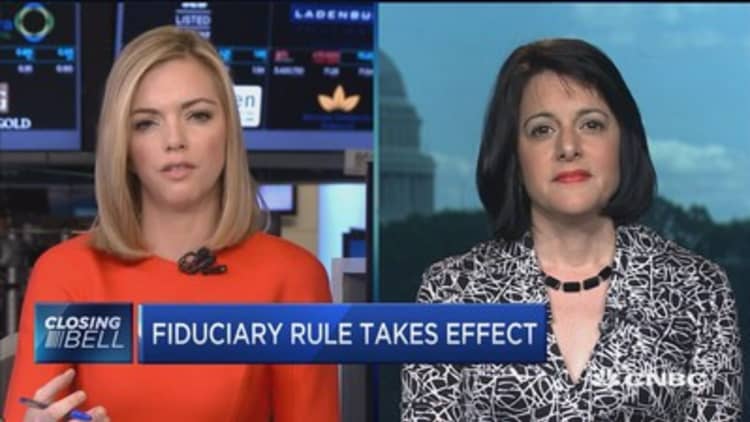Retirement savers are left in limbo now that a court decision has knocked down an investor protection rule.
The 5th Circuit Court of Appeals on Thursday decided to vacate the "fiduciary rule," a regulation from the Labor Department that would require advisors working with IRA and 401(k) savings to place investors' interests before their own.
Portions of the rule already began taking effect in 2016, including a provision that required financial advisors to charge no more than reasonable compensation, avoid misleading statements and provide advice in the best interest of the investor.
Other parts of the rule, however, would have been delayed to July 1, 2019. This includes a provision that would permit advisors to continue earning commissions, provided they enter a contractual agreement that they will act in the client's best interest.
Each advisor and each firm will have to ask themselves what's the best thing to do now.Blaine Aikinexecutive chairman, Fi360
It remains to be seen whether advisors and their firms will keep up their practices to mitigate conflicts of interest — or will they abandon their efforts.
"The 5th Circuit decision allows product pushers to provide what any reasonable person would view as investment advice without being held subject to a fiduciary standard that's appropriate for their role," said Micah Hauptman, financial services counsel at the Consumer Federation of America.
"Investors should ask their advisors if they are a salesperson pushing products or a true advisor who is willing to abide by a fiduciary standard," he said.
Here's what you can expect to see with your financial advisor after the court decision.
No sudden changes
Broker-dealers and wirehouses have spent the last few years preparing their infrastructure so that they can comply with the investor protection rule.
Steps firms have taken to mitigate conflict include making commissions level so that advisors don't have an incentive to recommend one investment over another.
Firms also have increased the availability of advisory accounts so that they can charge level fees based on client assets as opposed to commissions.
Right now, you shouldn't expect to see your advisor's firm gut those changes.
"It's too soon to know what the future of the rule is," said Bradford Campbell, partner at Drinker Biddle.

"The policies that firms have adopted in response to the rule are a combination of technical changes from compliance, plus policy changes in how institutions operate. Some might stick even if others change."
At this point, the decision doesn't immediately strike down the fiduciary rule.
Labor can still choose to appeal this decision and ask for a stay in the ruling while it continues to tweak the regulation.
"The Labor Department was pursuing a regulatory process to review the rule and make some material changes," said Campbell. "They've defended their actions in court so far, but at the same time, they're trying to change the rule in practice."
At the same time, firms are also keeping an eye on the Securities and Exchange Commission, which has been drafting its own version of the fiduciary rule.
Already a fiduciary
If your advisor or firm has already been acting as a fiduciary, they may stay the course and perhaps even promote their services so as to distinguish themselves.
"Each advisor and each firm will have to ask themselves what's the best thing to do now," said Blaine Aikin, executive chairman of Fi360, a provider of fiduciary education.
"You can ratchet down to this lower standard of care available before the fiduciary rule, or you can stay the course and stick with what you've done," he said. "Or you might ramp up your marketing and say that you could back away from being a fiduciary, but you won't."
Commissions remain
Wirehouses and broker-dealers that have already taken the steps to keep level commissions may opt to stay that way, while emphasizing that they are mitigating conflicts of interest.
"You may see some levelizing on commissions, but you'll continue to see the commission side staying in existence," said Marcia Wagner, managing director of The Wagner Law Group.

This method of payment may exist alongside fee-based advisory, where clients are charged fees based on their assets under management.
For instance, as part of its preparation for the fiduciary rule, Morgan Stanley made both fee-based advisory and commission-based brokerage available to clients.
The wirehouse is now reviewing the 5th Circuit's decision, said Christine Jockle, a spokeswoman for Morgan Stanley.
The best advocate
You are your own best advocate when it comes to choosing an advisor. Consider the following questions when you're seeking a professional to oversee your retirement savings.
Are you a fiduciary? Find out immediately if your advisor is acting in your best interest. Get the point across with this fiduciary oath from the Committee for the Fiduciary Standard. It's best to ask this question in writing.
How are you paid for your services? Ask whether you're paying a fee for your advisor's help, be it hourly, as part of a subscription or based on assets he or she manages for you. Find out whether your advisor receives a commission for the sale of mutual funds, insurance and annuities.
Where do you keep your assets? Some large broker-dealer firms will hold your assets in custody because you have a brokerage account with them. If you're using an independent fee-only advisor, he or she will likely hold your assets at a custodian, such as TD Ameritrade, Charles Schwab or Fidelity.
What are your qualifications? There's an alphabet soup of different designations for financial advisors, but keep an eye out for the best-known credentials: certified financial planner, chartered financial analyst and certified public accountant. Though each of these designations correspond to different specialties, all three require study and practical experience.
More from Personal Finance
Court ruling means that retirement savers could lose an Obama-era protection
A financial advisor must amid fiduciary rule delays
The rule that protects your retirement savings may be on the ropes


